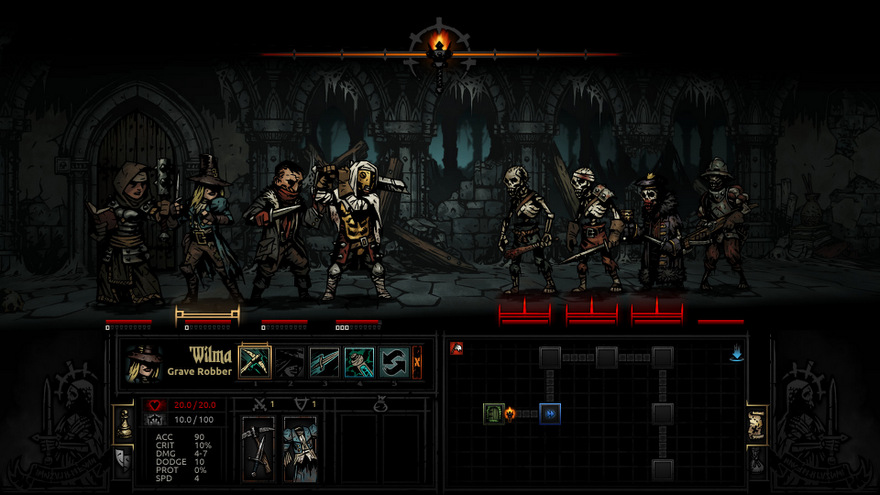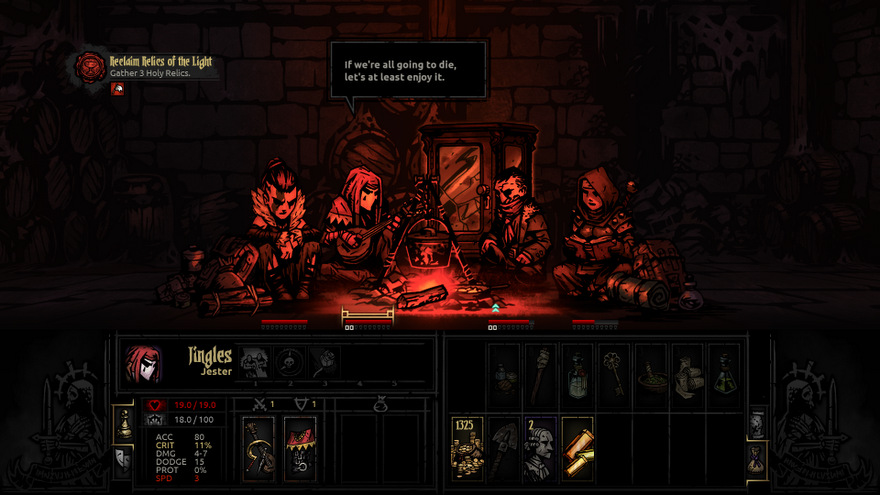Claustrophobic hallways, demonic monsters, deadly traps at every turn: These are just a few of the perils our fantasy heroes confront in the name of earthly riches. But what is the psychological price to pay for fame, wealth, and glory?
Darkest Dungeon, from Vancouver-based Red Hook Studios, explores the traumatic reality of diving into the claustrophobic pits of unknowable horrors that make up your typical fantasy dungeon. The gothic, turn-based roguelike features a mental health system dubbed The Affliction System, which attempts to represent the wide variety of ways people respond to intense stress.
Faced with stressful situations such as the death of a party member or a horrifying creature, characters in Darkest Dungeon will respond with temporary “afflictions” based on their inherent emotional constitution. While one character may steel her resolve in the face of overwhelming odds, another may succumb to panic and undermine the party’s chances at victory. Other afflictions may send characters into hopeless despondency, or to selfishly act on their own accord.
“We all have good parts and bad parts, and we all react to stress differently,” says Tyler Sigman, game designer at Red Hook Studios. “And we wanted to map that onto fantasy heroes. It’s easy to paint in stereotypes, but we were inspired by how people really are.”
The system doesn’t end when combat is over. Characters can also develop long-term traumas the team has termed “quirks,” which range from physical ailments like the runs or a bad eye, to mental disorders such as phobias and manias. Like afflictions, quirks can also have a positive effect on your character, boosting their fighting abilities or improving their ability to handle stress.
The Affliction System is meant to help portray that the characters in Darkest Dungeon are humans, and not just pawns in a quest for loot. There is, in fact, a striking resemblance between the Affliction System and psychological stress models commonly used to study actual human behavior. Take, for instance, the General Adaptation Syndrome model developed by Hans Selye.
The model posits that humans respond to stress in three distinct stages: alarm, resistance, and exhaustion. Alarm is when we first recognize a stressor, activating our hormones to prepare for a response. Resistance is when these hormones attempt to subdue the stressor, and exhaustion occurs when the stressor cannot be beaten—potentially leading to long-term physical and psychological damage.
In Darkest Dungeon, characters experience stress in much the same way: they start in a state of homeostasis (in game terms, their stress level is at 0), enter a state of alarm upon experiencing a stressor, attempt to resist (namely from experiencing positive outcomes such as a critical hit), and will finally succumb to a kind of exhaustion once the stress reaches an unbearable level.

The main difference is that, in Darkest Dungeon, the effects of exhaustion are immediately consequential to your party’s success—once a party member reaches the “exhaustion” state, they react depending on their predetermined personality. Just like in real human psychology, this can take the form of many different coping mechanisms: while one character may act out aggressively, another may retreat inward in an irrational hope to escape from the overwhelming stress.
The Diathesis-Stress model theory also aligns well with the Affliction System, especially when it comes to the development of quirks. The model is often used to explain the development of psychopathology in response to overwhelming stress by contrasting a person’s inherent threshold for handling stress with environmental stressors. If environmental stressors overwhelm a person’s threshold, a disorder develops—likewise, in Darkest Dungeon, each character has a threshold that, once crossed, results in an extreme psychological reaction.
Interestingly, stress often spreads virally throughout your party while exploring the Lovecraftian dungeons of the game. Once one party member experiences a stress, it can cause a snowball effect that sends your party spiraling downward into psychological torment. This kind of “secondhand” stress is likewise reflected in real human behavior; for many of us, the office is one of the most likely places to experience the phenomena first-hand. The system as a whole forces the player to sacrifice their normally untouchable agency to the realities of human behavior.
“The idea was to create that sense of being a manager or a sports coach, where you can’t at all times control what your team is doing,” says creative director Chris Bousrassa. “You issue orders and they do their moves, but when they’re really stressed out sometimes they’ll ignore you or do something on their own. It’s frustrating to you as a player, but that’s the point. These guys are starting to fall apart, starting to lose their grip. And we wanted to communicate that by making you lose your grip on them.”
Besides human psychology, the developers have also looked at movies and shows that have explored similar themes. Alien, The Thing, and Band of Brothers were particularly notable influences for the developers, as each attempted to represent how groups would react under intense stress and isolation.
All three feature extraordinary circumstances—a psychosexual xenomorph, a shapeshifting extraterrestrial, and the most devastating war in human history—that, in terms of their effects on the human psyche, are not all that different from the dark and gloomy halls of a demon-infested dungeon.
The settings of each are also quite similar: the groups are isolated from the normal outside world and placed in a realm of terror and madness. Once there, they end up fighting themselves and each other as much as their purported enemy.
What may be the biggest separation between Darkest Dungeon and its inspirations is that, in a dungeon crawl, the heroes are willingly risking their lives and psyches—after all, riches, glory, and redemption beckon. Darkest Dungeon wants to make sure that these rewards, just like in real life, don’t come without a price.
Darkest Dungeon is available on Steam Early Access.

